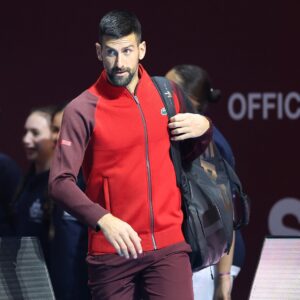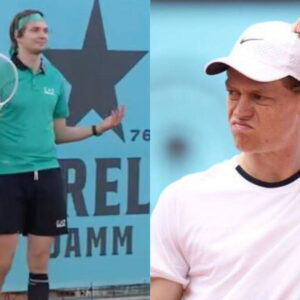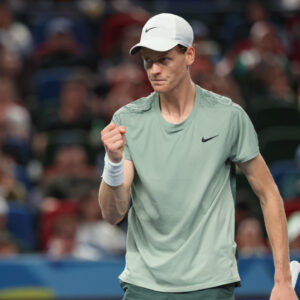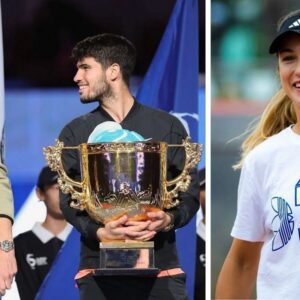Even a warrior like Rafael Nadal cannot refuse the call of “Father Time”…
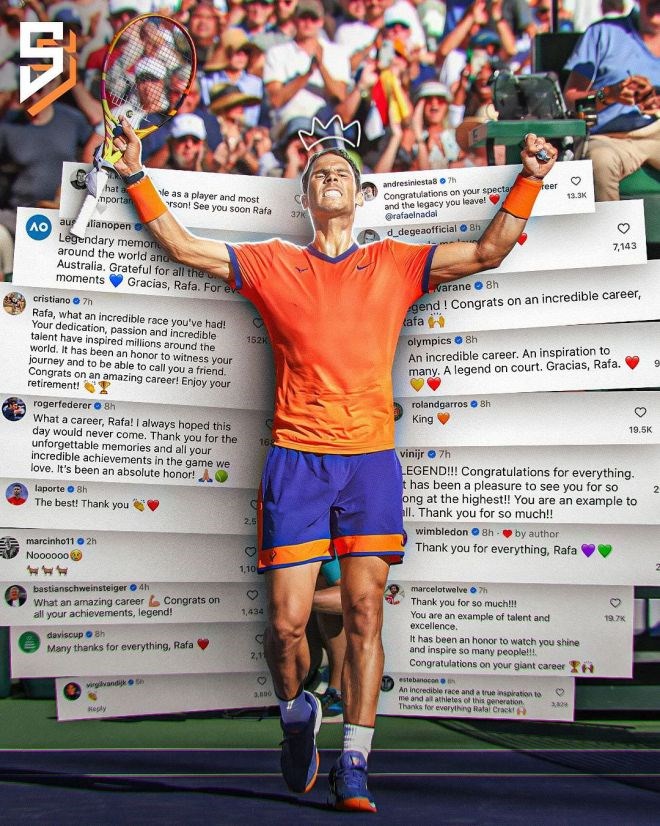
Accept the truth
For the first time in Rafael Nadal’s long, illustrious and glorious career, he accepted defeat. A player who normally never knew when he was beaten, admitted that it was time to stop. One of the greatest warriors in world sport laid down his sword and shield, bowing to the fact that no one – not even he – could overthrow the relentless, soul-crushing power of “Father Time.”
It’s well known that Nadal’s tennis days are numbered. The Spanish great announced in 2023 that 2024 would likely be his last year on the court. So, after a year that started and ended badly – including a first-round defeat at the French Open and a second-round exit at the Olympics in the same venue in Paris – Nadal has finally made it official that his body has nothing more to offer – and he’s hanging up his racquet.
No more brushing off the dust from sweaty bodies after a victory at Roland Garros. No more fidgeting with shorts, tapping rackets on shoe soles, stroking noses, tucking hair behind ears before serving with 20 seconds between points.
No more superstitions about placing water bottles in the right places. No more Rafael Nadal, the “King of Clay.” No more 14-time French Open champion, the man who dominated the clay courts in an irresistible and incomparable way.
Sadness has enveloped the sport. He has been honored by his peers and stars from other fields. Novak Djokovic, Roger Federer, Carlos Alcaraz have all paid their respects. So have icons of world football such as Cristiano Ronaldo and Lionel Messi.
Nadal is a 22-time Grand Slam winner, 2-time Olympic Gold Medalist, 36-time Masters champion and 5-time Davis Cup winner. With more Grand Slams than Djokovic among men, Nadal’s name will forever be etched in history. An iconic athlete whose greatness extends far beyond tennis. His presence in the game will be remembered.
More than just numbers
But Nadal has more than just numbers. A career defined by sheer will, unrivalled heart and a relentless drive to fight every point as if it were the last. Yet it has also been a career plagued by setbacks and injuries. In his early years, he suffered from tendinitis, and as he grew older and more fragile, his feet and hips began to fail him.
Nadal has missed more than 15 Grand Slams in his career due to injury, and has also withdrawn a few times. But perhaps that is what makes every victory sweeter. In 2021, Nadal suffered a serious injury to his left foot and missed the second half of the year. It is unclear when he will return, and in what condition, if he does, it seems unlikely that he will ever compete at the highest level again.
But Nadal returned at the Australian Open in early 2022 and in astonishing form, he reached the final, where Daniil Medvedev tried to block his way. Nadal lost 2 sets to Medvedev and was almost defeated. He could not break down the defense of the “Russian wall”.
But somehow Nadal pulled a rabbit out of his hat – as magicians do. Dubbed the “Miracle of Melbourne”, the Spaniard fought back from the brink to defeat Medvedev 2-6, 6-7, 6-4, 6-4, 7-5 in five hours and 24 minutes – the second-longest final in Grand Slam history.
After all the doubts about whether he would ever return to the top, that victory proved to be a comeback within a comeback. Right at the site of the most painful defeats of his career, Nadal managed to tame all those fears.
He won his 22nd Grand Slam – his last major title – at the French Open a few months later, a remarkable feat, as it was later revealed that Rafa had been given injections in his legs throughout the tournament, leaving him completely numb.
The Last Stab
Nadal had no idea that at the next Grand Slam he would suffer an injury that would prove to be the final blow to his career at the highest level. During his Wimbledon quarterfinal against Taylor Fritz, Nadal suffered an abdominal injury. However, he fought back to win 3-6, 7-5, 3-6, 7-5, 7-6 (4).
In a way, it was fitting that it was the final epic of his career. Bloodied and bruised but still finding a way to win was the story of the great man’s career. In 2009, Nadal defeated Fernando Verdasco in one of the greatest matches of all time in the Australian Open semi-finals. The match lasted 5 hours and 14 minutes.
Two days later, he reached the final and defeated Roger Federer, who was in much better shape, in four hours and 23 minutes. One of the all-time classics. Bloodied and bruised. But still winning…
After his win over Fritz, Nadal withdrew from the tournament, and we have not seen the same Nadal since. “Father Time” has called. Whether it is physical breakdown or simply missing a step or two, it happens to everyone.
In the final set of his singles career, Federer was defeated 6-0 by Hubert Hurkacz. In Usain Bolt’s final race, he collapsed midway through the match, having to stop due to a hamstring injury. Legendary boxer Muhammad Ali lost his final match to Trevor Berbick after 10 rounds.
Look at where Djokovic is now. His aura of invincibility is gone. Gone are the days when his mere presence could win him titles. Now he has to accept that he is playing second fiddle to Jannik Sinner and Alcaraz – men 14 and 16 years his junior, respectively.
In typical Nadal fashion, the 38-year-old has turned down the chance to hold a farewell ceremony at Roland Garros this year, hoping that maybe – just maybe – he can keep “Father Time” around a little longer. But if he can’t, then no one can.
Nadal’s legacy
Nadal’s 23-year career has made him more likeable than his great rivals Federer and Djokovic. Federer has a God-given talent, moving around the court like a ballerina, making the grueling sport look effortless without a drop of sweat on his brow.
Djokovic has an unquenchable desire to be the best. Brutal and obsessive, he is a master at reaching into his darkest recesses to win. A natural beast, Nole will take your breath away on court with his sheer determination.
But Nadal, he was not born with Federer’s natural gifts and he does not possess Djokovic’s cold ruthlessness. He is a unique athlete of his generation, who throws himself around the court with an unquenchable hunger. And when he is tired, he is really tired. He sweats profusely as he strains every muscle.
But above all, Nadal is a man who has fought to do what he loves, against all odds. From his days as a naive 15-year-old boy from Mallorca to a 38-year-old father, Nadal has made sure he leaves everything behind. And really, that’s all you can ask for.
“Doubts give you the ability to work harder, be more humble, and accept that you need to keep working hard to improve things,” he said in 2017.
So as Nadal heads for the exit door, he will be hoping that he can achieve his dream finish and go out on a high note, winning Spain’s sixth Davis Cup. But there is no doubt: it has been the most incredible journey. The highest peaks and the lowest valleys.
There is no light without darkness. And no one knows that better than Nadal. His status as a sports immortal has been cemented, but ultimately, Nadal remains a mortal of tennis.


